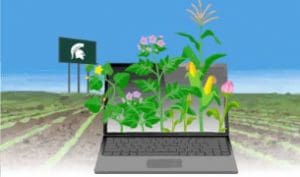 Despite many closures to prevent the spread of COVID-19, the agriculture industry has continued to progress in these uncertain times to meet supply and demand needs.
Despite many closures to prevent the spread of COVID-19, the agriculture industry has continued to progress in these uncertain times to meet supply and demand needs.
Farmers and others in the agriculture industry have been declared essential workers by the government to keep up on food production.
Mark Seamon, research director of the Michigan Soybean Promotion Committee, said staff is working from home and maintaining responsibilities using computer, Internet and cell phones. “This has cost some efficiency and is delaying some progress, but essential operations continue,” he said.
With spring passing and summer nearly here, planting season has kept up on many levels. The timing of field operations is critical to successful crop production. Planting cannot be stopped altogether without affecting the entirety of the industry.
“This epidemic is going to have what we call a long tail,” said Jim Zook, executive director of the Michigan Corn Growers Association and the Corn Marketing Program of Michigan. “This means that we are going to feel the effects of this for months if not years.”
Breeding programs have been similarly affected.
“Breeding is a continuous stream of work year after year,” said Dechun Wang, professor in the Department of Plant, Soil and Microbial Sciences. “Interruption of the work will have a significant detrimental effect to the breeding program.”
Wang studies the genetics of soybeans and works to develop new soybean varieties.
“We have moved the seed preparation work to the homes of our team members,” Wang said.
Zook sees these continued efforts by the agriculture industry as a sign of hope for what is to come.
“Farmers are still going to plant because they have passion for it and it’s in their nature,” Zook said. “Planting is a sign of hope and in the middle of this pandemic, hope is what we all need.”
Tom Herlache, technology manager at the MSU Innovation Center, said plant variety licensing has been busy even with the shutdowns.
“We are seeing uptake of several of MSU’s potato varieties in particular, and our licensees are reporting good order volume and are planting their seed production fields,” Herlache said. “Spring only comes once a year, and planting crops is clearly essential work.”
